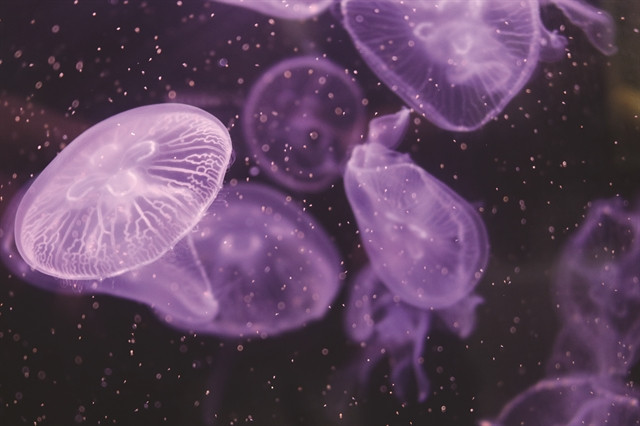By Hồng Linh
 |
| Beautiful jellyfish swim inside specialised tanks at Trinh's house – VNS Photo Hồng Linh |
Trinh's fascination with jellyfish began in 2019 when she encountered them at an aquarium exhibition in China.
"I love animals, so when I saw some cute animals, like these jellyfish, I was amazed. Furthermore, no one would have thought that jellyfish could be kept in such mini-models at home like this. That is why I decided to buy them," she said.
According to her, this hobby of raising jellyfish is not new in other countries. She has gained valuable knowledge from various sources, including Jellyfish farmers, social media platforms, and even scientific research, which has been a guide for her from the beginning.
Trinh now keeps over a hundred jellyfish, divided into the following kinds: Floating Bell, Moon jellyfish, and Wire jellyfish. They can survive in a temperature from 25°C to 28°C with water salinity from 1,023 S‰ to 1,025 S‰.
These jellyfish pose no harm or toxicity to humans, with a remarkable lifespan extending up to four years.
Because of her vast collection of jellyfish, she has to raise them in an air-conditioned room, which helps maintain optimal living temperature and avoid direct sunlight.
However, bringing them to Việt Nam was a difficult mission.
"The import distance from the jellyfish farm to HCM City is very far and takes two to three days. There will always be plenty of jellyfish loss," Trinh shared.
"Those that survive will receive special recovery treatment. However, not many survived in the past because I lacked experience," she added.
Experience taking care of jellyfish.
She said: "If someone wants to start this hobby, they should have a suitable jellyfish tank at least."
In addition, the tank usually has a light system that enhances the jellyfish's appearance without causing harm.
"The right tank requires two things: A flow generation system and an aquarium filtration system," she added.
 |
| Some of the jellyfish tanks at Trinh's house – VNS Photo Hồng Linh |
She noticed that maintaining a clean water environment is of utmost importance in jellyfish cultivation, as inadequate water quality may lead to adverse effects, such as jellyfish shrinkage or the appearance of holes on their body.
The ocean currents influence a jellyfish's biology; without proper flow, they remain immobile, affecting their health and shape.
The food of jellyfish is Artemia, known as brine shrimp. It is cheap and can be bought in any aquarium store.
 |
| Trinh feeds the jellyfish with Artemia, known as brine shrimp, a food for aquaculture. – VNS Photo Hồng Linh |
She mentions that a saltwater environment akin to the ocean is essential, and a convenient and effective way to do this is by using fresh water with artificial sea salt. Moreover, this contains vital nutrients that facilitate the growth and development of jellyfish. Otherwise, natural seawater could be an option, but its purification process poses considerable challenges, making it a less practical choice.
 |
| Salinometer, a tool to precisely measure the percentage of salt in the water in a tank. – VNS Photo Hồng Linh |
Based on her observations, the miniature jellyfish aquarium model is gaining immense popularity, particularly among children and women.
She noticed many people, especially children and women, fondly keeping miniature jellyfish aquariums at home.
She also has social media platforms like TikTok and Facebook to share experiences and helpful tips for anyone intrigued by the world of miniature jellyfish aquariums.
Trinh advises beginners to start with easily manageable and affordable species such as moon jellyfish and red moon jellyfish. Chrysaora fuscescens jellyfish are also a good choice, albeit at a higher price.
Furthermore, Trinh suggested using a water chiller for optimal cooling instead of air-conditioned rooms or water-cooling fans if people only keep them in small tanks, which is cheaper but still ensures good condition for jellyfish care.
Trinh hopes to establish a thriving jellyfish enthusiast community in Việt Nam. – VNS